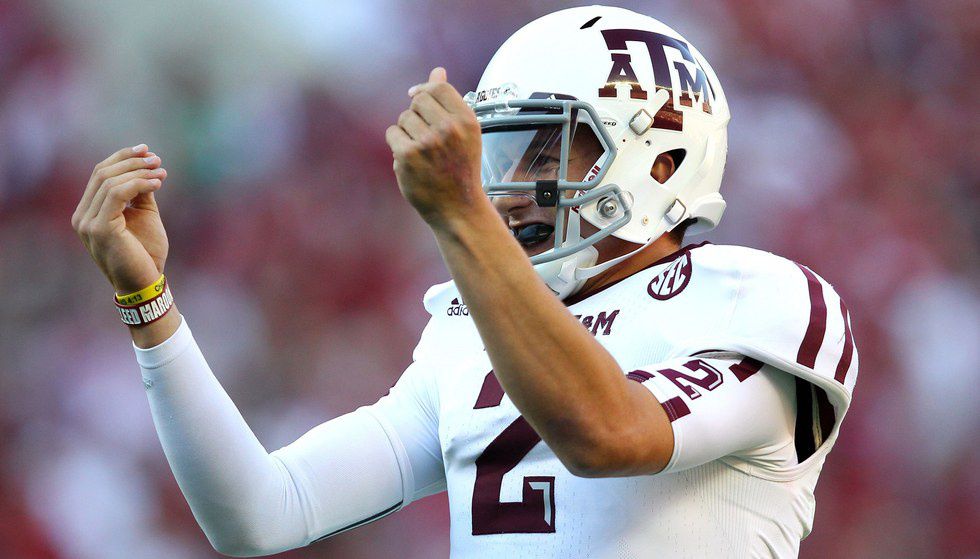Johnny Manziel had everything going for him. The Texas A&M quarterback had won the 2013 Cotton Bowl Classic, 2013 Chick-fil-A Bowl, and was the first freshman in NCAA history to win the Heisman Trophy, Davey O'Brien National Quarterback Award, and the Manning Award. And to top it off, he was selected as the 22nd overall pick in the NFL Draft by the Cleveland Browns, who hoped that Manziel would finally bring them back to glory. But now, the public views "Johnny Football" as a NFL draft bust, a narcissist, and an alcoholic. Some of Manziel's closest friends are even concerned that he is going to die soon. However, his college career could be foreshadowing his current struggles if basic psychology is used to analyze Manziel's actions.
Manziel's troubles could be rooted as early as his freshman year of college. After an win against #1 ranked Alabama in 2012, Manziel instantly became a college football superstar. However, before the Alabama game, Manziel was described as a guy who enjoyed a normal college lifestyle, going to Texas Rangers games, golf tournaments and concerts like most other college students. One of Manziel's closet friends, J.B. Moss realized that after the Alabama game, Manziel's demeanor changed. Moss states, "He couldn't even go out to eat in College Station because it would cause such a scene. Johnny had never even thought about being famous before. But almost overnight he went from a couple thousand followers on Twitter to a million." Manziel was even spotted having dinner with celebrities like Lebron James and Drake after the Alabama game, and fans started to question his work ethic on the field. After winning the Heisman trophy, Manziel was involved in an investigation in which he was suspected of selling autographs to fans, which is illegal in the NCAA. Afterwards, he developed a new celebration- the money celebration (which it seemed he was rubbing money in between his fingers after a touchdown). His increasing fame and the consequences of it reveal one of Manziel's traits- narcissism.
According to Mayo Clinic,narcissistic personality disorder is defined as "A disorder in which people have an inflated sense of their own importance, a deep need for admiration and a lack of empathy for others." Sigmund Freud's On Narcissism further explores egoism through self-concept, which is our sense of selves (this includes such characteristics like pride and confidence). He believes that our self-concept is derived from three sources: the residue of our original primary narcissism, fulfillment of the imagined expectations of our ideal ego, and the satisfaction we get when our love is returned to us. Freud believes that we are not born with an ego, but rather it evolves through fulfilling expectations, which further grows the ego. So, what does this have to do with "Johnny Football"? Well, when he was at Texas A&M, he had expectations as a quarterback to do his job extremely well. He already had an ego, it just wasn't evolved until the Alabama game. After his record-breaking Alabama game, Manziel's ego evolved due to the expectations he fulfilled for himself and the people he loved (including family, teammates, fans). As a result, he gained newfound fame and wanted more satisfaction for himself. This could be the underlying reason his work ethic was questioned- his satisfaction wasn't just from football, but from partying. Due to his fame, he was often hanging out with celebrities and constantly at parties (whether at a college or at a night club), and wanted to grow his popularity. This obviously had consequences, as shown during his time with the Cleveland Browns.After his sophomore year at Texas A&M, Manziel chose to forgo his junior year and declare for the NFL Draft. He was projected to be a top pick, and was eventually chosen by the Cleveland Browns in the 1st round. Cleveland was having quarterback troubles, and fans hoped that Manziel would bring the Browns back to glory. However, this is when Manziel first started to get into controversy. In a preseason loss to the Washington Redskins, Manziel made a hand gesture and was fined $12,000 as a result. During the 2014 regular season, his work ethic was constantly questioned by fans and the media, as he was regularly seen partying and drinking. In the 2015 offseason, he checked himself into a rehabilitation center for alcohol addiction, but troubles still occurred during the regular season. After the 2015 regular season, Manziel was fired, his agent no longer represented him, all commercial ties were cut, and was just indicted on a misdemeanor domestic violence charge. Instead of being the quarterback the Browns were hoping for, Manziel caused more scandal than results.
One of the consequences of narcissistic personality disorder is low self-esteem. Low self-esteem is often due to a person's insecurities, with some symptoms including mistrusting others and having a slightly perfectionist attitude. Manziel can be characterized as someone with low self-esteem, due to his actions off the field. Maybe, if we look at this psychologically, Manziel resorted to partying and alcohol dependence (both insecurities) because of his poor performance on the NFL field. At Texas A&M, he had high self-esteem due to his excellent performances in high-stake games, and constant praise from fans. In Cleveland, however, Manziel was seemingly not ready for professional football, which might have caused some of his insecurities to rise from his ego. We may never know if all of this is true. We may also never know if Johnny Manziel actually suffers from narcissistic personality disorder, or if he is just mildly egotistical. But by looking at Manziel's "downfall" psychologically, we might have a better idea on why "Johnny Football" is now struggling to get by.




























